No CrossRef data available.
Published online by Cambridge University Press: 24 October 2022

1. See also Ronald C. Newton, “On ‘Functional Groups,’ ‘Fragmentation,’ and ‘Pluralism’ in Spanish American Political Society,” HAHR 50, no. 1 (Feb. 1970):1–29; Howard J. Wiarda, “Toward a Framework for the Study of Political Change in the Iberic-Latin Tradition: The Corporative Model,” World Politics 25, no. 2 (Jan. 1973): 206–35; Wiarda (ed.), Politics and Social Change in Latin America: The Distinct Tradition (Amherst: University of Massachusetts Press, 1974); James A. Morris and Steve C. Ropp, “Corporatism and Dependent Development: A Honduran Case Study,” LARR 12, no. 2 (1977):27–68.
2. In my opinion, these divergences, important as they may be, are not essential for the purposes of the general arguments presented in this review.
3. Richard R. Fagen, “Studying Latin American Politics: Some Implications of a Dependencia Approach,” LARR 12, no. 2 (1977): 10 (author's emphasis).
4. For useful discussions of dependence theory (theories), imperialism, etc., see the issues of Latin American Perspectives, especially 1, no. 1 (Spring 1974); 2, no. 2 (Spring 1975); and 3, no. 4 (Fall 1976).
5. In this vein, see Guillermo O'Donnell, “Estado y alianzas en la Argentina, 1956–1976,” Documento CEDES/G.E. CLACSO, Buenos Aires, no. 5 (October 1976), and “Reflections on the Patterns of Change in the Bureaucratic-Authoritarian State,” LARR 13, no. 1 (1978):3–38.